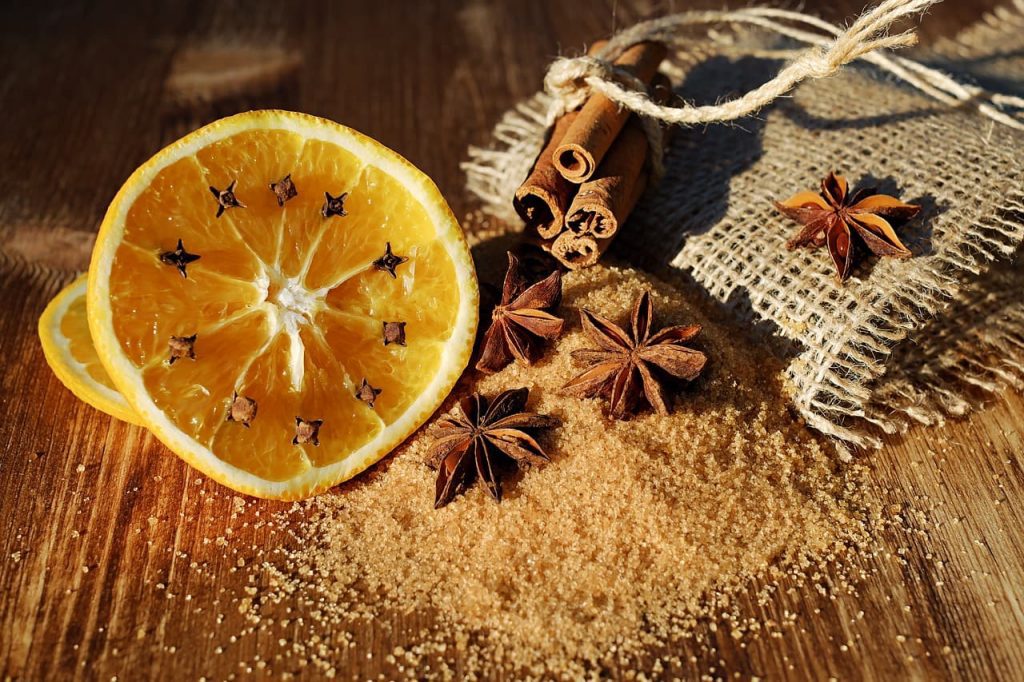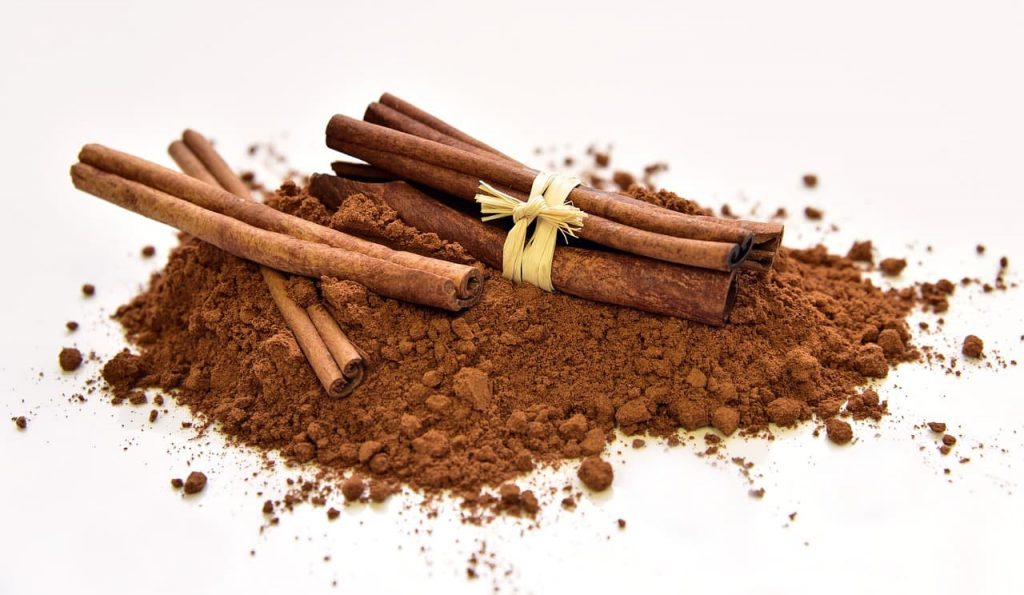Cinnamon is one of the oldest spices, even before our time, the raw material obtained from the bark of the cinnamon tree was preferred. It is an almost essential ingredient in Christmas cooking, which can be used mainly to make mulled wine and sweets with great success. The smell is very characteristic, strong. It comes into the kitchen in the form of ground or cinnamon sticks, but it is true for both versions that it is paired primarily with fruit. as a spice. Primarily for flavoring cakes, but you can also toss in a simple banana smoothie, not to mention hot chocolate. They can also be used to flavor bolder roasts. One of the essential scents of Christmas is cinnamon.

Fruit soups and various plum and apple sweets also appreciate the presence of cinnamon. Although few use it this way, cinnamon can also be added to meats. It is also used in Indian and Chinese cuisine for main courses, but it can also be tried for lamb, the exotic taste is guaranteed.
What is cinnamon?
The name Cinnamon covers the plants Cinnamomum verum and zeylanicum, which have been exported from Sri Lanka and India for more than 2,000 years. Variants of these plants have spread in a few more places in the world, such as Vietnam. Another cinnamon plant is also known, Cinnamomum cassia, i.e. cassia or Chinese cinnamon, which differs from ceylonin in that it has a higher coumarin content, which is why attention should be paid to the amount ingested. The branches of a tropical tree are peeled off at their place of origin, the bark is allowed to dry out a bit and then the outermost layer is removed. The inner crust curls due to drying. We can buy this typical piece of wood, or its ground, as cinnamon.
Excessive amounts of coumarin compounds can affect blood clotting and damage the liver. Still, we have nothing to fear from cinnamon, and coumarin is also present in peppermint and lavender.
Ancient cinnamon wood and cassette also differ in appearance, as well as their store-bought pieces. Cinnamon is much more parchment-like, its rolls intertwined many times over. Cassettes are thicker pieces, usually with only the edges bent. The process is a little different as they are made, but their main flavors are the same. True spice maniacs can pay attention to which one they get, because different cinnamon species have different oil content, and cassettes usually result in a sweeter taste experience, e.g., in cakes.
They are difficult to distinguish in the form of groats unless the species of tree is inscribed on them; the powder of the cassia is darker, that of the original cinnamon is lighter, redder.
Of course, there is no need to over-discriminate, an average user can use any of them to season their coffee or rice cakes.
There are three different versions of cinnamon available: Ceylon, Chinese, and Malabar. They also differ in color and scent. The milder, spicy-tasting Ceylon cinnamon is the most common, but anyone who likes particularly pungent flavors should try the Chinese version as well. Cinnamon is a popular ingredient not only in cuisine but also in medicine.
Health effects of cinnamon
In addition to its gastronomic use, the beneficial physiological effects associated with the consumption of cinnamon have been studied for several years, and it has been found in several cases that the herb has a beneficial effect on our biochemical processes. Let’s see in what cases cinnamon can be used for additional medicinal purposes!
Against bacteria and inflammation
The effect of cinnamon in cases of gingivitis has also been studied and compared with chlorhexidine, a known disinfectant. The result is that the active ingredients in cinnamon reduce plaque formation, mouth odor, and gingivitis to a lesser extent, as they inhibit the growth of bacteria that build up in the plaque. Not surprisingly, we also find cinnamon in toothpaste and chews.
Not only can the spice control the bacteria in the mouth, but experiments have shown that it also inhibits the growth of the e-coli bacteria that parasitize the intestines and is antiviral and antifungal.
Because of these, it can be great during colds and flu, but even as a foot bath if you have a fungal infection. Related to the above, it is used successfully for anti-inflammatory effects, especially for joint problems, but is also good for relieving fever and pain.
Diabetes and insulin resistance
The aldehyde content of cinnamon has been found to be several times useful in relation to blood glucose levels. It regulates your blood sugar in such a way that if you eat it with carbohydrate-rich, sugary foods, your blood sugar levels will fluctuate less. This, in turn, affects the insulin response, which is why cinnamon is thought to be effective in type 2 diabetes and in reducing insulin resistance. Of course, cinnamon is also beneficial in non-diabetic individuals, as it reduces the rise in blood sugar after a meal and thus does not develop wolf hunger. But it can also be beneficial for dieters because of its effects and the fact that it stimulates metabolism.
Blood fat and cholesterol
Cinnamon stimulates digestion, helps break down fat, and also has a beneficial effect on blood fat levels, the presence of triglycerides. These can cause fatty plaques that can build up on the blood vessel wall and cause severe vascular problems.
It also has an indirect effect on cholesterol, as it lowers the amount of LDL cholesterol in the blood.
For good digestion
In addition to fats, cinnamon generally stimulates digestion, prevents bloating and gas formation. It can also be used for nausea, let’s put a knife-tip of ground cinnamon in our favorite drink and it will not only uplift it but also soothe our digestive problems.
When mixed with honey, you can even take it against the formation of a stomach ulcer by consuming it.
Skin rejuvenating effect
Due to its active ingredients and antioxidant content, it is an important ingredient in cosmetics, as it tones the skin and stimulates its metabolism. For this reason, it can often be found in massage oils (body wrap, cellulite treatment). Of course, the phenol content does not only rejuvenate the skin, it affects the aging process of all our cells.
Skin rejuvenating effect
Recent research has shown that the active ingredients in cinnamon improve perception, aid learning processes, and stimulate memory and cognitive abilities.
Cinnamon has been shown to stimulate the healing of microscopic brain injuries, but it can also improve fine motor skills and even play a role in preventing Alzheimer’s disease due to its ability to improve brain function.
Cinnamon also has a mood-enhancing effect, but it’s no longer just because of brain support, but the smell itself has an effect on our mood.
Against high blood pressure
Regular consumption of cinnamon has a beneficial effect on blood pressure, and in the long run on the development of complications (heart attack, stroke). In addition, diabetes is a precursor to heart problems, but since it also improves it, it can be doubly effective.
Alternative uses of cinnamon
Cinnamon can also be useful in our garden, as it has been found to help rooting plants, and ants avoid it by far, so it is also effective to spray it against them. It can even be sprayed with cinnamon and warm water, which is excellent against wilting fungal diseases.
Can Excessive Cinnamon Consumption Have Adverse Effects?
Cinnamon is an excellent spice that even has health-preserving effects, so we don’t have to be scared of it, but of course, like everything, it’s not recommended to consume too much (more than a teaspoon or two).
On the one hand, cinnamon is a powdery substance from which, if we wanted to get it with a big spoon, it would be especially harmful because it would act as an irritating state in our respiratory system. Therefore, in children, make sure that it is consumed only in dissolved form or mixed with food and drink, and do not play with it! Otherwise, like any powder, it can cause serious damage if inhaled or swallowed in large doses.
When preparing and seasoning our food, do not use a crazy amount of it, but if you take cinnamon for medicinal purposes, it is good to stay in moderation. No one will get better results with exaggerated cinnamon, moreover, the accumulating coumarin compounds will damage the liver in the long run, but may even inhibit blood clotting. If you decide to use cinnamon because of its beneficial effects, it is better to choose the 100% organic, Ceylon version!
It is rare, but there are people who are allergic to cinnamon and it has severe symptoms (burning, itching, swelling of the tongue) in them. However, this is likely to be seen as early as the first dose, even in childhood, so they should not try cinnamon at all.
How to store cinnamon?
Store both whole and ground cinnamon in an airtight container, protected from light.
In all other cases, it is worth using cinnamon, baking and cooking with courage, taking advantage of its positive effects on the vascular system and blood sugar levels, as it has been seasoning the everyday life of mankind since ancient times!
Last updated: September 24, 2023


